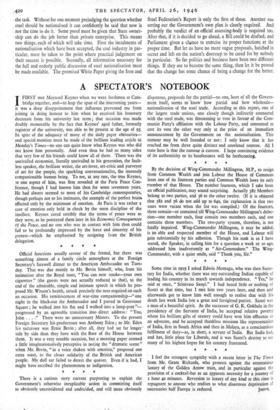A SPECTATOR'S NOTEBOOK
▪ FIRST met Maynard Keynes when we were freshmen at Cam-
▪ bridge bridge together, and—to leap the span of the intervening years— it was a deep disappointment that influenza prevented me from joining in doing honour to him when he received his honorary doctorate from his university last term ; that occasion was made doubly memorable by the fact that Keynes' aged father, formerly registrar of the university, was able to be present at the age of 93. In spite of the adequacy of many of the daily paper obituaries— and special mention must be made of the brilliant leading article in Monday's Times—no one can quite know what Keynes was who did not know him personally. And even then he had so many sides that very few of his friends could know all of them. There was the unrivalled economist, literally unrivalled in his generation, the fault- less speaker, the brilliant writer, the art-lover, art-critic and purveyor of art for the people, the sparkling conversationalist, the intensely companionable human being. To me, at any rate, the true Keynes, or one aspect of him, was first revealed at the Paris Peace Con- ference, though I had known him then for some seventeen years. He had always seemed to most of his Cambridge contemporaries, though perhaps not to his intimates, the example of the perfect brain. affected only by the minimum of emotion. At Paris it was rather a case of emotion only held in check by the stern discipline of the intellect. Keynes cared terribly that the terms of peace were as they were, as he portrayed them later in his Economic Consequences of the Peace, and no one who was in contact with him then could fail to be profoundly impressed by the force and sincerity of his protest—which he emphasised by resigning from the British delegation.
* .*


























 Previous page
Previous page